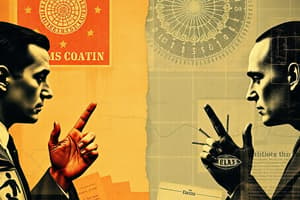Podcast
Questions and Answers
What was the primary reason Ryanair was considered a low-cost airline in Europe?
What was the primary reason Ryanair was considered a low-cost airline in Europe?
- It used a flexible pricing strategy.
- It avoided unnecessary costs. (correct)
- It offered a wide range of luxury services.
- It pioneered the use of frequent flyer programs.
In the context of corporate competition, what is a key characteristic of price competition?
In the context of corporate competition, what is a key characteristic of price competition?
- Companies aim to set price levels that are uniformly high.
- Companies focus solely on product innovation.
- Companies engage in exclusive advertising partnerships.
- Companies compete for market share primarily by lowering prices. (correct)
What strategy emerged as the winning approach in Robert Axelrod's repeated prisoner's dilemma tournament?
What strategy emerged as the winning approach in Robert Axelrod's repeated prisoner's dilemma tournament?
- Aggressive competition to eliminate opponents.
- Random choice to confuse opponents.
- Defection for maximum gain.
- Tit for Tat, involving cooperation and reciprocity. (correct)
What challenge does corporate collusion create for market dynamics?
What challenge does corporate collusion create for market dynamics?
What is a potential consequence of overfishing in a shared fishing area?
What is a potential consequence of overfishing in a shared fishing area?
What is a notable feature of the 'Judo strategy' in business?
What is a notable feature of the 'Judo strategy' in business?
What dilemma do political candidates often face during campaigns?
What dilemma do political candidates often face during campaigns?
What common outcome can result from lack of trust in arms races, such as during the Cold War?
What common outcome can result from lack of trust in arms races, such as during the Cold War?
Flashcards
Prisoner's Dilemma
Prisoner's Dilemma
A situation where two individuals or entities must choose between cooperation and betrayal without knowing what the other will choose.
Tit for Tat
Tit for Tat
A strategy in the Prisoner's Dilemma that involves cooperating on the first move and then mimicking the opponent's previous move.
Prisoner's Dilemma in Business
Prisoner's Dilemma in Business
A situation where firms, competitors, or partners must make strategic decisions that affect each other.
Judo Strategy
Judo Strategy
Signup and view all the flashcards
Overfishing
Overfishing
Signup and view all the flashcards
Corporate Collusion
Corporate Collusion
Signup and view all the flashcards
Arms Race
Arms Race
Signup and view all the flashcards
Political Campaigns: Attack Strategy
Political Campaigns: Attack Strategy
Signup and view all the flashcards
Study Notes
Low Cost Airlines
- Southwest Airlines was the first low-cost airline, founded in 1967.
- Ryanair, founded in 1985, was a European low-cost airline, aiming for minimal costs.
Prisoner's Dilemma
- A game theory concept where two entities choose between cooperation and betrayal.
- Relevant in business to understand strategic decisions.
- Unknown actions of the other party create uncertainty.
Cooperation vs. Competition Examples
- Price Competition: Coke vs. Pepsi
- Advertising Strategy: McDonald's vs. Burger King
- R&D and Innovation: Apple vs. Samsung
- Sustainability and Environmental Policies: Shell vs. BP
Prisoner's Dilemma in the Business World
- Airline Route Entry: Ryanair's choices in the UK-Ireland route, facing uncertainty of other airlines’ actions (Aer Lingus & BA).
- Corporate Collusion: Competing companies might set high prices to keep profits—though price wars hurt all involved.
- Overfishing: Fishermen's dilemma: the need for cooperation to avoid overexploitation, but individual incentives encourage overfishing.
- Political Campaigns: Negative campaigning strategy – attacking opponents or running positive campaigns.
- Workplace Collaboration: Productivity gains from teamwork can be reduced by one employee withholding effort.
Repeated Prisoner's Dilemma Tournament
- In the 1980s, political scientist Robert Axelrod conducted a tournament of strategies for the Prisoner's Dilemma.
- The winning strategy, "Tit for Tat," involved cooperating first and then mimicking one's opponent's previous move.
- This underscored the importance of reciprocity for successful cooperation.
Arms Race (Cold War)
- The U.S. and Soviet Union were caught in an arms race (competition for ever increasing nuclear weapons).
- Mutual distrust fueled the proliferation of nuclear weapons.
Judo Strategy
- A method for navigating competitive situations
- Emphasizes flexibility and leveraging opponent's force/strategy.
Studying That Suits You
Use AI to generate personalized quizzes and flashcards to suit your learning preferences.




